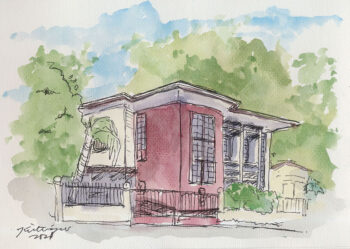NAAWAN, Misamis Oriental (MindaNews / 23 March) — Time was when the fish we bought in the market were strung in rattan or abaca strings. Vegetables and all other items were put together in a rattan and bamboo basket or in woven palm-leaves bag (bayong) in carrying them home. Dry goods from stores were brought home in paper bags or inside personal cotton knapsacks.
There was no bottled water. Travellers in urban areas either had to stop to drink water inrestaurants and eateries or drink free direct from public piped-in water.
In rural areas travellers drink water direct from wells hand-pumped. People then had so much trust in the cleanliness of publicly provided water whether piped in or pumped out.
Life was so simple and the surrounding was generally clean. The trash in public markets were mostly biodegradable – banana leaves, vegetable discards, banana peelings, peanut shells, and the like. Waste papers and paper-based wastes like used cardboard boxes, leaves and broken twigs from windblown trees were often found in parks and other public places. Flash floods in cities were hardly known then.
Then came the plastic invasion in the 1960s. Developed more than a century ago, plastic, a synthetic material derived mostly from petroleum oil, became significantly visible in the market because of its peculiar characteristics. Highly malleable, that can take any form and shape, and can have varying thickness and strength, plastics become a boon to the construction and manufacturing industry, competing and replacing in part, steel, wood, concrete, glass and fibers. Plastics have been in everything, in personal items, equipment, home appliances, computers, cars, space ships, etc.
The plastic boon turns to bane, however, when plastic bags were invented in the late 1970s alongside with one-use plastic packaging materials or receptacles for waters and other liquids, medicines, health products and some food items.
Plastics came at a time when most societies had fallen to consumerism, where social status is measured and glorified by material consumption or possession.
Our convenient way of life somehow developed in us an unsentimental throwaway culture such that plastic water and soda bottles, cups and bags we only use once are irresponsibly disposed, clogging urban waterways resulting to the phenomenon of flash floods even in the slightest of rain for 30 minutes. Plastics and other wastes left behind by campers and hikers are known to cause forest fires.
Plastics irresponsibly disposed in land find their ways into rivers, estuaries, and the coastal waters smothering mangrove saplings, choking corals, and fish and crustacean feeding grounds. Plastics wastes in the waters degrade and reduce fish stock and, thus, hurt the livelihood of fishers.
Needless to say, plastics uglify the environment and destroy wildlife. Plastic debris of all kinds, apparently taken as food had been found in the stomach of dead whales, dolphins, and seabirds.
Marine scientists of the National Oceanic and Atmospheric Administration theorize that by actions of the various forces in the oceans, plastic debris slowly disintegrate into fine nano pieces that sink in the ocean bottoms and end up in planktons, the primary producer in the ocean food chain. The nanoplastics are ingested by fishes that fed on planktons, and are ultimately eaten by humans. It is not yet established though how these nano particles affect humans.
The final destination of all plastic trash is, of course, the oceans. Some 8 million tons of plastic trash from land leak into the oceans annually, and it’s getting worse every year.
Sadly, the Philippines is among the six worst plastic polluters of the oceans, according to a 2010 study of the journal Science. The list includes: 1. China 2. Indonesia 3. Philippines 4.Vietnam 5.Sri Lanka and 6.Thailand. The United States contributes as much as 242 million pounds of plastic trash to the ocean every year, according to same study.
To remove the country’s place in the Hall of Shame, it is imperative that the government regulates nationwide the production and use of one-use plastic receptacles like bottles and bags. And it should begin to develop aggressively a program to return to the production of glass receptacles and traditional bags made from local biodegradable materials. The backward linkages in the production of the traditional products may yet provide livelihood opportunities to a lot of people. (MindaViews is the opinion section of MindaNews. William R. Adan, Ph.D., is a retired professor and former chancellor of Mindanao State University at Naawan, Misamis Oriental, Philippines)







